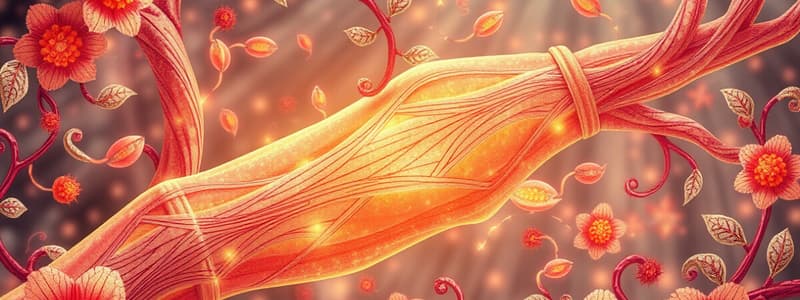Podcast
Questions and Answers
What role does calcium calmodulin play in smooth muscle contraction?
What role does calcium calmodulin play in smooth muscle contraction?
- It inhibits the activity of myosin light chain kinase.
- It serves as a calcium reservoir for skeletal muscle activation.
- It activates myosin light chain kinase through phosphorylation. (correct)
- It directly binds to myosin light chains to induce contraction.
Which of the following components is NOT part of the troponin complex in cardiac muscle?
Which of the following components is NOT part of the troponin complex in cardiac muscle?
- Troponin C
- Troponin D (correct)
- Troponin T
- Troponin I
How do cardiac troponin T and I differ from those found in skeletal muscle?
How do cardiac troponin T and I differ from those found in skeletal muscle?
- They share identical amino acid sequences with skeletal troponins.
- They are recognized by different specific antibodies. (correct)
- They bind to calcium with different affinities than skeletal troponins.
- They are encoded by the same gene as the skeletal isoforms.
What initiates the signaling pathway leading to smooth muscle contraction?
What initiates the signaling pathway leading to smooth muscle contraction?
What is the primary structural characteristic that differentiates smooth muscle from skeletal muscle?
What is the primary structural characteristic that differentiates smooth muscle from skeletal muscle?
What similarity do the contraction mechanisms of cardiac and skeletal muscles share?
What similarity do the contraction mechanisms of cardiac and skeletal muscles share?
Which factor does NOT contribute to the contraction of smooth muscle cells?
Which factor does NOT contribute to the contraction of smooth muscle cells?
What type of mutations are primarily associated with dilated cardiomyopathy (DCM)?
What type of mutations are primarily associated with dilated cardiomyopathy (DCM)?
How do mutations in cardiac muscle proteins differ from those in skeletal muscle proteins?
How do mutations in cardiac muscle proteins differ from those in skeletal muscle proteins?
Which of the following mutations is associated with hypertrophic cardiomyopathy (HCM)?
Which of the following mutations is associated with hypertrophic cardiomyopathy (HCM)?
What structural feature is characteristic of microtubules?
What structural feature is characteristic of microtubules?
Which motor protein is primarily associated with microtubules?
Which motor protein is primarily associated with microtubules?
In relation to muscle contraction, what is the significance of the Z line within the sarcomere?
In relation to muscle contraction, what is the significance of the Z line within the sarcomere?
What approach can be utilized for the detection of cardiomyopathies?
What approach can be utilized for the detection of cardiomyopathies?
What is the primary nucleotide involved in the dynamic instability of microtubules?
What is the primary nucleotide involved in the dynamic instability of microtubules?
What is a common characteristic of both actin filaments and microtubules?
What is a common characteristic of both actin filaments and microtubules?
What is the primary effect of colchicine on microtubules during cell division?
What is the primary effect of colchicine on microtubules during cell division?
How do microtubule-associated proteins (MAPs) contribute to neuronal function?
How do microtubule-associated proteins (MAPs) contribute to neuronal function?
Which protein is known for promoting disassembly of microtubules?
Which protein is known for promoting disassembly of microtubules?
What is the role of γ-tubulin in microtubule dynamics?
What is the role of γ-tubulin in microtubule dynamics?
How does Taxol affect microtubule dynamics?
How does Taxol affect microtubule dynamics?
What role does the GTP cap play in microtubule dynamics?
What role does the GTP cap play in microtubule dynamics?
What is the defining characteristic of dynamic instability in microtubules?
What is the defining characteristic of dynamic instability in microtubules?
How does the hydrolysis of GTP in beta tubulin affect microtubules?
How does the hydrolysis of GTP in beta tubulin affect microtubules?
What is the primary difference between treadmilling and dynamic instability in microtubules?
What is the primary difference between treadmilling and dynamic instability in microtubules?
What is one function of microtubule-associated proteins (MAPs)?
What is one function of microtubule-associated proteins (MAPs)?
What action does the drug Nocodazole perform on microtubules?
What action does the drug Nocodazole perform on microtubules?
Where does microtubule elongation primarily occur?
Where does microtubule elongation primarily occur?
Which statement accurately describes protofilaments?
Which statement accurately describes protofilaments?
What is the effect of Taxol on microtubules?
What is the effect of Taxol on microtubules?
What is the primary structural difference between cardiac muscle cells and skeletal muscle cells?
What is the primary structural difference between cardiac muscle cells and skeletal muscle cells?
Which condition is characterized by systolic dysfunction and ventricular dilation?
Which condition is characterized by systolic dysfunction and ventricular dilation?
How does the missense mutation R403Q affect cardiac beta-myosin heavy chain?
How does the missense mutation R403Q affect cardiac beta-myosin heavy chain?
What is a common feature of both dilated and hypertrophic cardiomyopathy?
What is a common feature of both dilated and hypertrophic cardiomyopathy?
What is the primary clinical sign associated with hypertrophic cardiomyopathy?
What is the primary clinical sign associated with hypertrophic cardiomyopathy?
What type of mutation is commonly observed in familial hypertrophic cardiomyopathy?
What type of mutation is commonly observed in familial hypertrophic cardiomyopathy?
Which of the following best describes the state of cardiomyocytes in an intact heart?
Which of the following best describes the state of cardiomyocytes in an intact heart?
Which type of inheritance is associated with hypertrophic cardiomyopathy?
Which type of inheritance is associated with hypertrophic cardiomyopathy?
What consequence does the mutation affecting Arginine 403 in myosin have on muscle function?
What consequence does the mutation affecting Arginine 403 in myosin have on muscle function?
Flashcards are hidden until you start studying
Study Notes
Smooth Muscle Contraction
- Smooth muscle is involuntary and non-striated.
- Contraction mechanism involves calcium calmodulin and myosin light chain kinase (MLCK).
- Calcium binding activates MLCK, which phosphorylates myosin light chains, leading to muscle contraction.
Cardiac Muscle Structure and Function
- Cardiac muscle operates as a precisely engineered machine with individual cells called cardiomyocytes.
- Troponin complex regulates cardiac muscle contraction, consisting of Troponin T, I, and C.
- Cardiac and skeletal troponins differ significantly and are encoded by different genes, not isoforms.
- Cardiac muscle is striated but operates independently of motor neuron control, relying on intercalated discs for synchronized contraction.
Cardiomyopathies
- Two primary types: Dilated Cardiomyopathy (DCM) and Hypertrophic Cardiomyopathy (HCM).
- DCM is characterized by systolic dysfunction and ventricular dilation; prevalence ranges from 1:250 to 1:2500.
- HCM involves concentric wall thickening, particularly affecting the left ventricle; its prevalence is approximately 1:200.
- Both conditions can lead to heart failure and sudden cardiac death, often stemming from sarcomere mutations affecting proteins like myosin, actin, and troponin.
Genetic Mutations and Their Impact
- Mutations cause diverse cardiomyopathies, often within genes coding for sarcomeric proteins.
- Familial hypertrophic cardiomyopathy (FHC) can lead to sudden death even without prior symptoms.
- Specific mutations, like R403Q in cardiac beta-myosin heavy chain, significantly escalate ATPase activity and increase contractility, contributing to hypertrophy.
Microtubules: Structure and Dynamics
- Microtubules are hollow tubes made of alpha and beta tubulin dimers, exhibiting polarity with (+) and (–) ends.
- They originate from the centrosome and display dynamic instability, regulated by GTP hydrolysis.
- Stability is linked to the presence of a GTP cap; lack of this cap leads to rapid disassembly termed catastrophe.
Microtubule Functions
- Serve critical roles in organelle distribution and vesicle trafficking within cells, assisted by motor proteins such as dyneins.
- Microtubule dynamics can be modified by various drugs, like Taxol (which stabilizes) and Nocodazole (which destabilizes).
Experimental Observations
- Live monitoring of microtubules reveals dynamic instability through fluorescence microscopy, illustrating that microtubules continuously grow and shrink based on cellular demands.
Pathological Implications
- Genetic mutations impacting cardiac muscle structures can inform potential therapeutic approaches, emphasizing the need for understanding molecular mechanisms underlying cardiomyopathies.
- Advances in genetic analysis enable detection of specific mutations linked to conditions like DCM and HCM, aiding in diagnosis and personalized treatment strategies.### Microtubule Dynamics and Regulation
- Alkaloids and Microtubule Interaction: Certain alkaloids stabilize free tubulin, preventing microtubule polymerization and leading to depolymerization.
- Taxol Effects: Taxol increases microtubule polymerization through its stabilizing effects, enhancing microtubule assembly.
- Colchicine Mechanism: Colchicine binds to alpha and beta subunits of tubulin, inhibiting their association and preventing microtubule formation, thus acting as a mitotic poison.
- Polyploidy Induction: By blocking mitotic spindle formation, colchicine can induce polyploidy, making it useful in plant genetic improvement.
Microtubule Organizing Center (MTOC)
- Location and Composition: The MTOC is found near the nucleus and Golgi apparatus, composed of proteins including γ-tubulin.
- Centrosome Role: The centrosome acts as the primary MTOC in animal cells, containing centrioles surrounded by pericentriolar material.
- Microtubule Growth: New microtubules nucleate from γ-tubulin ring complexes and grow toward the (+) end.
Microtubule-Binding Proteins
- Dynamics Regulation: Microtubule-binding proteins modulate microtubule dynamics, akin to actin filament regulation.
- Stathmin: Binds to free tubulin dimers, sequestering them and regulating microtubule stability.
- TIPs (Tubulin Interacting Proteins): Bind to the (+) end, anchoring microtubules to membranes and facilitating interactions with cellular structures.
- Kinesin-13: A destabilizing protein that promotes microtubule disassembly.
- Severing and Crosslinking Proteins: Katanin serves as a severing protein for microtubules; MAPs (Microtubule Associated Proteins) stabilize filaments and facilitate bundling.
Neuronal Importance of MAPs
- Stabilization in Neurons: MAPs play crucial roles in stabilizing microtubule bundles in neurons, essential for axon and dendrite structure.
- Molecular Transport: They assist in transporting neurotransmitters along microtubule tracks.
Indirect Immunofluorescence for Protein Detection
- Antibody Utilization: Specific primary antibodies identify target proteins, while secondary antibodies recognize the primary ones for detection via fluorescence.
- Multifluorescence Analysis: Allows simultaneous visualization of multiple proteins, enhancing research accuracy and efficiency.
- MAP2 and TAU: Distinct in size; MAP2 fosters wide microtubule spacing, while TAU promotes tighter bundling within neuronal structures.
Microtubule Plus-End-Binding Proteins
- Stabilization and Growth Promotion: Proteins that bind to the (+) end enhance microtubule stability and growth.
- End-Binding Proteins (EBs): Specifically bind GTP-tubulin caps at the growing ends, allowing visualization of microtubule dynamics through fluorescent markers.
- Dynamic Monitoring: Using recombinant proteins like GFPEB1, the dynamics of microtubule growth and interaction in living cells can be tracked.
Microtubule Cytoskeleton Visualization
- Cellular Dynamics: Video-assisted studies indicate the visibility of growing microtubules, highlighting their dynamic nature and overall cytoskeletal architecture in the cell.
- Static vs. Dynamic Microtubules: Only growing microtubules bind to EB1, while static or shrinking microtubules are distinguishable with GTP-tubulin labels.
Studying That Suits You
Use AI to generate personalized quizzes and flashcards to suit your learning preferences.



